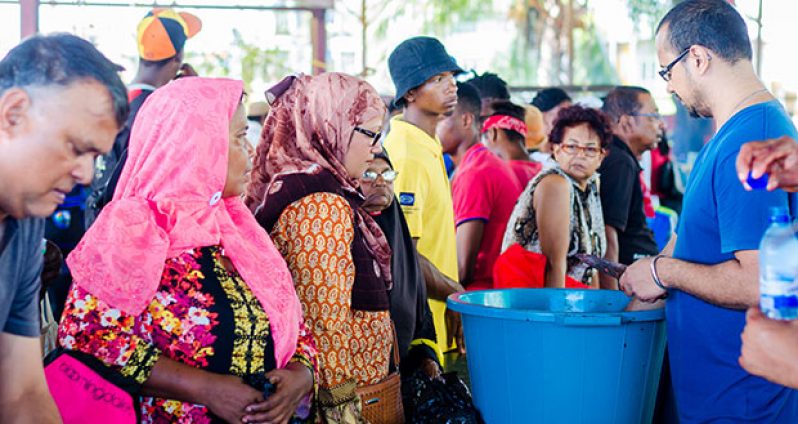By Rabindra Rooplall
MUSLIMS countrywide have, on Monday morning, commenced a three-day celebration known as Eid-ul-Adha; also known as the “festival of sacrifice”, “festival of feast”, or “Qurbani”.Many Muslims from various masjids, including the Anna Catherina Islamic Complex (ACIC); the Central Islamic Organization of Guyana (CIOG); Kitty and Queenstown masjids; the Peter’s Hall Mosque and the Alexander Village Old Mosque, celebrated with family members and friends, offering prayers and doing charitable acts. All these places of worship were filled with scores of people

participating in the annual celebration.
This venerable event is held annually to remember the willingness of Prophet Abraham to sacrifice his son Ishmael as an act of obedience to God. A few traditions associated with Eid include sacrificing animals, as the Prophet Abraham had done; purchasing new clothes for the festival; and gathering friends and family members together for a feast.
According to President General of the Anna Catherina Islamic Complex (ACIC), Hakeem Khan, Eid-ul-Adha marks the end of Hajj, the sacred pilgrimage to the holy city Mecca. It is customary for every able Muslim (as prescribed in the Five Pillars of Islam) to go on a Hajj at least once during his lifetime.
Khan explained that the history behind Eid-ul-Adha follows the story of the faithful Abraham who was, in a dream, instructed by Allah to raise the foundations of the Kaaba, a black stone, the most sacred Muslim shrine in Mecca (Saudi Arabia), which Muslims face during their prayers (salat).
Immediately responding to the Lord’s call, Abraham set off for Mecca, along with his wife and son Ishmael. Mecca was, at that time, a desolate and barren desert, and Abraham had to face a lot of hardships; however, he obeyed Allah’s commands uncomplainingly. In a divine dream, he also saw himself sacrificing his son Ishmael for Allah’s sake. When he told this to Ishmael, the latter immediately asked his father to carry out the Lord’s commands without faltering, and assured that he was completely ready to give up his life for God.
But, miraculously enough, when Abraham was about to sacrifice Ishmael, Allah spared the boy’s life and replaced him with a lamb. And that was what Abraham ultimately sacrificed.
Khan noted that to commemorate this outstanding act of sacrifice (qurbani) by Prophet Abraham, people sacrifice a lamb, goat, ram, or any other animal on Eid-ul-Adha; and they give the meat to friends, neighbours, relatives and the needy. People who are away from the holy pilgrimage, Hajj, also carry out this traditional sacrifice; hence, Eid-ul-Adha is also known as the Feast of Sacrifice, or the Day of Sacrifice.
Dan Rahim of the Kitty Masjid disclosed that Eid-ul-Adha is about remembering the Prophet Ibrahim and the dream he had about sacrificing the one thing he loved the most — his son.
“You see, he was an old man longing for a child. He prayed to God for an obedient son, who will be God-fearing and kind.”
Rahim continued: “Allah has given us power over animals, and (has) allowed us to eat meat, but only if we pronounce his name at the solemn act of taking life. Muslims slaughter animals in the same way throughout the year. By saying the name of Allah at the time of slaughter, we are reminded that life is sacred.”
He said it is very important to understand that the sacrifice itself, as practised by Muslims, has nothing to do with atoning for sins, or using the blood to wash themselves from sin.
This, he said, is a misunderstanding by those of previous generations. “It is not their meat nor their blood that reaches Allah; it is your piety that reaches Him.”
One Central Islamic Organisation of Guyana (CIOG) official noted that Eid- ul-Adha commemorates one of the greatest acts of sacrifice in the annals of human history, and should be used as a time of reflection.
“The most important part of this holy and auspicious day is that it is a day of reflection; it is a day of rededicating our [lives] to the service of the Creator and Sustainer of this universe. It is a day of understanding that in order to effect any change in our masjids, community, society and the world at large, we have to start first by changing ourselves,” the official said.



.jpg)









